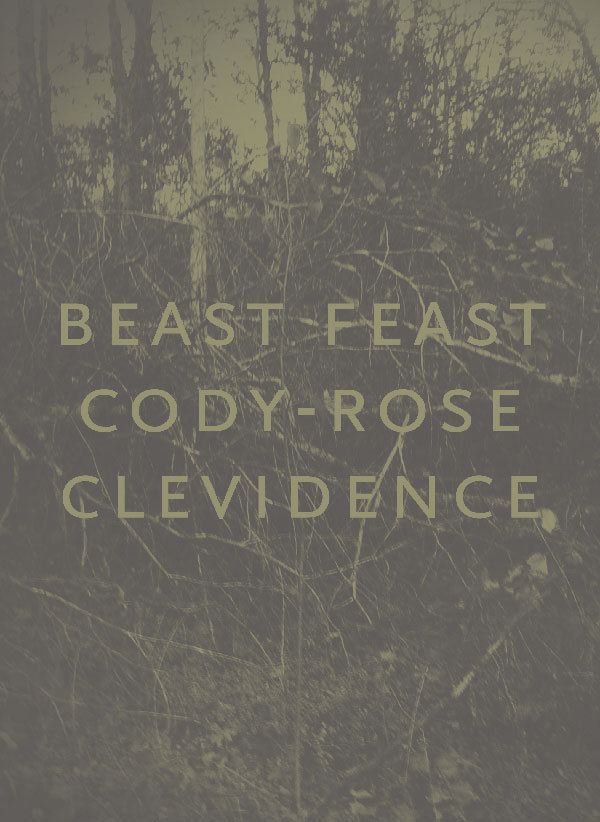
Beast Feast
Cody-Rose Clevidence
112 pages, paperback
ISBN 978-1-934103-53-1
Ahsahta Press, 2014
Review by John Findura
Halfway through Cody-Rose Clevidence’s first book, Beast Feast, we get lost in a forest. Many of us, I suspect, will become lost before ever reaching that point. Clevidence seems to have run off far ahead of us, leaving a dense underbrush of crossed-out words, fractured syllables, and a use of the shift key that at times produces poems that look more like musical notation than any known phonetic expression. Clevidence has bent the rules of poetry until they’ve shattered, and then she’s scooped the pieces back up and assembled them into some new language.
It’s tempting to quote from the more opaque poems like XYLO, which begins
khjou[o9u4L
;OJdalsfhoij
poi[N/OPIP
OI?>>>PO{
And that means? I have no idea. But the further we go in, the more we start to find
IAMAMonk
EYINTHEF
ORESTo;iw
herISwhereI
SITT
Suddenly, the monkey starts to become visible as our eyes adjust to the confusion of the world right in front of us, and I’ll be damned if reading this doesn’t feel like a world starting to slowly open up. Little jewels start appearing, as in [What A Waste Is Made] , which begins: “What waste is made on uncontrollable things. what manic needs a well fed / violin. a sarcophagus for kings.” The simple dropping of the “A” from the title to the first line should serve to let the reader know that what you get is always different from what you are being offered.
Like a forest, all sorts of interesting flora and fauna pop up. Some favorite lines include these from A State of Nature / A Natural State:
<< I want to give my love a rose I want to love a growing thing w. petals I want to love a stolen thing: an undefinable # >>
reads like messed up HTML code before reaching
/ in the depths of the forest you can hear the low moans & grunts & quickened panting of numbers propagating in the dark.
The thin skin between the psychological and the physical becomes transparent at times, the same way the natural world and our own human world does in Clevidence’s hands. “MUSTARD SEED : MACED OR MACERATED FACE” she writes, mocking our own use of what nature gives us.
\now I will tell you how the dumb birds are supposed to fly. // \now I will tell you how the dumb big bucks are hunted. // \now I will tell you about the extreme stupidity of trees. // /now I will tell you how the brilliant markets glisten.
Perhaps one of the most coherent statements one can make about Best Feast is found in the poem ZYG, where Clevidence writes (without spacing and with line breaks) “there is a necessary displacement and ambiguous zone fluxuating around the relationships between subjects and objects[.]” This “zone” is, quite apparently, where these poems are living – suspended between subject and object: a fly stuck on a spider’s web.
Few books evoke place as much as this one evokes the entirety of the natural world. Reading it makes you smell the moss and hear the sucking mud precisely because it is difficult and scattered. It is a meditation that works. This forest is indeed dark and deep, but getting lost in it is as intriguing as it is frightening.
________________________________________________
 John Findura holds an MFA from The New School and is currently completing his professional license in psychotherapy. His poetry and criticism appear in numerous journals including Verse; Fourteen Hills; Copper Nickel; Pleiades; Forklift, Ohio; H_NGM_N; Jacket; and Rain Taxi. A guest blogger for the The Best American Poetry, he has won and been a finalist for various awards. He lives in Northern New Jersey with his wife and daughters.
John Findura holds an MFA from The New School and is currently completing his professional license in psychotherapy. His poetry and criticism appear in numerous journals including Verse; Fourteen Hills; Copper Nickel; Pleiades; Forklift, Ohio; H_NGM_N; Jacket; and Rain Taxi. A guest blogger for the The Best American Poetry, he has won and been a finalist for various awards. He lives in Northern New Jersey with his wife and daughters.